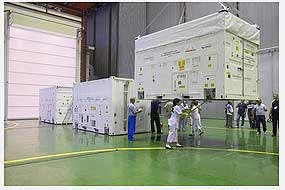Globalstar... Trio To Travel (Launch)
[SatNews] Three more for the company, as additional 2G satellites are delivered to the launch site for constellation inclusion.
 Completed Globalstar satellites as seen in their shipping containers at the Thales Alenia Space production facility in Rome. (Photo courtesy of Thales Alenia Space)
Completed Globalstar satellites as seen in their shipping containers at the Thales Alenia Space production facility in Rome. (Photo courtesy of Thales Alenia Space). (Nasdaq:GSAT) has now taken delivery of three additional second-generation (2G) satellites
from manufacturer
Thales Alenia Space. The three new satellites are being shipped to the
Baikonur Cosmodrome in Kazakhstan, where they will join the three new satellites that were delivered in early August. All
six 2G satellites will undergo preparations and testing for an October launch using the
Soyuz launch
vehicle. A total of four launches carrying six satellites each will be conducted by launch services provider
Arianespace using the Soyuz, which has been used to successfully launch Globalstar satellites on eight previous occasions. The Company plans to integrate the 24 new
satellites with the eight 1G satellites launched in 2007 to form a 32 satellite constellation. The new constellation is expected to secure Globalstar's space segment
beyond 2025.
 First three Globalstar second-generation satellites being delivered in August to the Soyuz pre-launch facility in Baikonur. (Photo courtesy of Arianespace)
First three Globalstar second-generation satellites being delivered in August to the Soyuz pre-launch facility in Baikonur. (Photo courtesy of Arianespace)
Once the six new Globalstar satellites are in operational orbit, the most immediate service improvement will benefit those customers who use the Company's voice and Duplex data services. With each subsequent launch, these customers can expect a progressive return to the high reliability and service quality enjoyed before 2007. Once fully deployed, the constellation and enhanced ground network are designed to provide Globalstar customers with services featuring increased data speeds of up to 256 kbps in a flexible
Internet protocol multimedia subsystem (
IMS) configuration. Products and services supported are expected to include: push-to-talk and multicasting, advanced messaging capabilities such as
multimedia messaging (
MMS), mobile video, geo-location services, multi-band and multi-mode handsets, and data devices with GPS integration. The 2G satellites are also designed to
support Globalstar's current lineup of voice, Duplex and Simplex data products and services, including the Company's lineup of
Spot retail consumer products.
Topical Tags :
Regional Tags :



